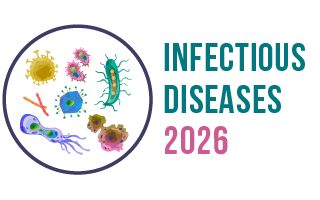4th International Conference on
Infectious Diseases
September 09-10, 2026 | Barcelona, Spain

Address: Avinguda Del Maresme 78 Ronda De Dalt Exit 15, 08940 Comella de Llobregat, Barcelona, Spain
Infectious Diseases 2026

Warwick Medical School, UK
Abstract:
Background: Juvenile idiopathic arthritis (JIA) is a common autoimmune disease (AD) of childhood. Although many factors can increase the risk of JIA, the underlying aetiology is largely unknown. Recently, ADs have been associated with disturbance of gut microbiome in early life and evidence links childhood antibiotic exposure to microbial dysbiosis. This has further been linked to JIA development through loss of intestinal barrier integrity, antigen leakage, and disruption of T cell differentiation. This paves the way for autoantibodies to form and inflammation of joint synovium to occur.Aim: The aim of this study was to establish whether antibiotic use in early life is associated with an increased risk of developing JIA, and to discover the underlying aetiology driving it.Method: A systematic search for peer-reviewed articles written from 2013 onwards was completed via Web of Science, MEDLINE and EMBASE (Ovid) following PRISMA guidelines. Specific search terms and synonyms were identified previously. All papers were exported to ONENOTE, duplicates were deleted and the papers were screened by title and abstract. Full text eligibility was then assessed. Articles were accessed via OpenAccess and the University of Warwick library catalogue to begin narrative synthesis.Results: Antibiotic exposure was significantly associated with the development of JIA, in a dose- and time-dependent manner; this remained once confounders were adjusted for. It was most significant in children under 24 months, excluding 0-6 months old. The link was not significant for prenatal antibiotic exposure. The strongest association was with broad- spectrum antibiotics. JIA rates were higher in children born pre-term and/or by C-section also, most likely due to the use of more post-natal antibiotics in these cases.Conclusion: This study suggests a role for antibiotics in the pathogenesis of JIA. Future practice may need to consider antibiotics as a modifiable risk factor in JIA and as over- prescription rates are high, restrictions may be necessary. Further work is needed to target the immune dysfunction associated with antibiotic induced-microbial dysbiosis.
Biography:
Shirin is an Irish medical student studying at Warwick Medical Student with a previous first class degree in Biomedical Science. She has a keen interest in paediatrics and infectious disease, enjoying these specialties at medical school. She won several academic awards during her undergraduate degree including the best microbiology result award, the Chris Hunter memorial prize for best dissertation project and Norman Richards memorial prize for receiving first class marks in all second and final year modules. Shirin’s named project which she will present as a poster takes an in depth look at the link between antibiotics used in this day and age and juvenile idiopathic arthritis. In her free time, Shirin enjoys gardening, swimming and loves dogs.
